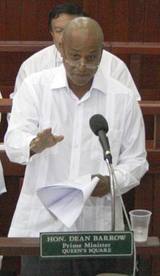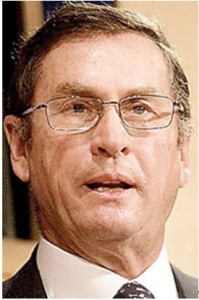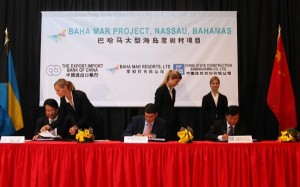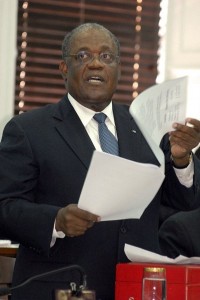 In August 2009 Belizean Prime Minister Dean Barrow orchestrated the nationalization of Belize Telemedia Limited, the county’s virtually monopolistic telecommunications company, in a manner that would make even Venezuelan President Hugo Chavez blush.
In August 2009 Belizean Prime Minister Dean Barrow orchestrated the nationalization of Belize Telemedia Limited, the county’s virtually monopolistic telecommunications company, in a manner that would make even Venezuelan President Hugo Chavez blush.
In a national address before a Special Sitting of the House of Representatives, PM Barrow justified this act by declaring that:
…the owners of Telemedia, as they have repeatedly demonstrated, will stop at nothing to frustrate the business of governance in this country; and will act with every resource at their command to thwart the interest and legitimate aspirations of the Belizean people.
(7 News Belize, August 24, 2009)
He then presented a veritable bill of indictment against his predecessor, PM Said Musa, for perpetrating a “sting operation,” which leveraged almost all of the shares in Telemedia into the control of one very powerful and litigious Englishman, Lord Ashcroft, whose net worth is reportedly equal to Belize’s entire GDP.
Even more damning, Barrow accused Musa of entering a secret Accommodation Agreement which, among other things, guaranteed Ashcroft a minimum rate of return of 15%; allowed him to pay no business tax or custom duties; stipulated that the government could not regulate Telemedia’s rates; revoked all other existing Telecoms licenses (except one other in which Ashcroft owns considerable interest); outlawed much cheaper VOIPs like Vonage; and enabled Telemedia to refuse interconnection to anyone at will.
This is why Barrow said he and his government:
… took counsel among ourselves and to a man … voted, in the name of the Belizean people, to resist this treasonous Accommodation Agreement at all costs. Belizean Law and Belizean dignity would be upheld; Belizean pride and Belizean patriotism and Belizean patrimony vindicated.
(7 News Belize, August 24, 2009)
 Given Barrow’s indictment, it was hardly surprising when the Belizean Supreme Court – finding that “telecommunications are a critical part of the development of Belize” – ruled this summer (on July 30) that the nationalization of Telemedia was entirely constitutional.
Given Barrow’s indictment, it was hardly surprising when the Belizean Supreme Court – finding that “telecommunications are a critical part of the development of Belize” – ruled this summer (on July 30) that the nationalization of Telemedia was entirely constitutional.
The court also dismissed all of Ashcroft’s claims, which called on it to enforce the Agreement. Incidentally, this ruling also vindicated Barrow’s contempt for a judgment of $38.5 million against his government, which Ashcroft won after seeking arbitration in London. In fact, the prime minister had vowed that:
… as God is my witness I will never pay that award… This is our House, this is our country. Here we are masters. Here we are sovereign. And with the full weight of that sovereignty, we must now put an end to this disrespect, to this chance taking, to this new age slavery. There will thus be no more Telemedia awards against us, no more Telemedia court battles, no more debilitating waste of government’s energy and resources, and there will be no more suffering of this one man’s campaign to subjugate an entire nation to his will.
(7 News Belize, August 24, 2009)
Not surprisingly, many throughout the region joined Belizean Opposition Leader Johnny Briceno in criticizing Barrow for taking this action – noting that it would have the kind of chilling effect on private investments in Belize that Chavez’s nationalization initiatives have caused in Venezuela. But these critics seem oblivious to the fact that Barrow could well have been guided by the action taken by President George W. Bush of the United States, who effectively nationalized the U.S. banking industry in the fall of 2008, or by that of his successor President Barack Obama, who effectively nationalized the U.S. car industry in the winter of 2009 – all purportedly in the public interest.
Indeed, the actions of these U.S. presidents were such that I felt compelled to comment on them as follows:
If nothing else, these bailouts should finally destroy the myth that the U.S. is running a capitalist, free-market economy. After all, these government actions not only privatized shareholder gains and nationalized losses, but are in fact indistinguishable from the way China runs its socialist, controlled-market economy.
(Chickens come home to roost on Wall Street…, The iPINIONS Journal, September 16, 2008)
Therefore, whether the nationalization of Telemedia was legal or consistent with free-market capitalism was settled by a Belizean court and two U.S. presidents, respectively. But I do wonder to what extent leaders in poor African, Caribbean and Pacific (ACP) countries will follow Barrow’s lead in nationalizing private companies in similar circumstances.
 The irony, of course, is that it’s far more likely that these leaders would be nationalizing the private investments of that socialist hegemon, China, instead of those of a billionaire investor like Lord Ashcroft.
The irony, of course, is that it’s far more likely that these leaders would be nationalizing the private investments of that socialist hegemon, China, instead of those of a billionaire investor like Lord Ashcroft.
After all, China has been buying up companies, as well as commensurate political influence, in ACP countries on a scale that makes Lord Ashcroft’s dealings in Belize seem pursuant to nothing more than the running of a lemonade stand.
More to the point, though, what happens if the Chinese, like Ashcroft, attempt to extract monopolistic profits from their investments or, even worse, attempt to use their investments to further an extraterritorial political or military agenda? For it’s one thing to nationalize the interests of one wealthy investor (or even a multinational corporation); it’s quite another to nationalize those of this rising economic and military superpower.
Showing a little prescience, here’s how I posed this ominous scenario five years ago in a commentary entitled China Buying Political Dominion Over the Caribbean (The iPINIONS Journal, February 22, 2005):
Consider international developments that might lead China, for strategic reasons, to base missiles in Jamaica or convert its container ports, factories and chemical plants in the region to dual military and commercial use.
Would the leaders of the Caribbean countries involved comply? Would they have any real choice in the matter? And would America then blockade the entire region – as it blockaded Cuba during the missile crisis?
Now consider China making such strategic moves in Africa or Latin America, where its ‘benign’ economic infiltration dwarfs its Caribbean operations. This Cold War could then turn very hot indeed….
 And if you think this is just a farfetched hypothetical, just consider the dilemma Bahamian Prime Minister Hubert Ingraham is now facing. For Ingraham is being forced to consider whether to squash a multibillion-dollar project (the Baha Mar resort and condominium complex at Cable Beach) because the Chinese financiers (namely, the Chinese government) want to include in the terms for funding:
And if you think this is just a farfetched hypothetical, just consider the dilemma Bahamian Prime Minister Hubert Ingraham is now facing. For Ingraham is being forced to consider whether to squash a multibillion-dollar project (the Baha Mar resort and condominium complex at Cable Beach) because the Chinese financiers (namely, the Chinese government) want to include in the terms for funding:
… a requirement that the overwhelming majority, if not virtually all of the workers to be engaged on the core project, over the life of the project, be foreign workers — some 8,150 persons.
(PM Ingraham, Bahamas Press, September 11, 2010)
And, if reports are to be believed, many of the Chinese workers being drafted to work on this and other regional projects give new meaning to the concept of working on a chain gang….
In any case, there seems little doubt that the leaders of many other ACP countries are facing, or will soon face, a similar dilemma. But I urge them to act, even where the Chinese are concerned, just as Barrow acted and as Ingraham is attempting to act; i.e., to protect the interests of their indigenous population as well as the sovereignty of their country.
NOTE: I regret Barrow’s reference to “new age slavery” in condemning the adhesive terms in the Accommodation Agreement that so benefited Lord Ashcroft. Not least because I am all too mindful that, just as it was Africans who conspired with Europeans to sell their brothers and sisters into slavery centuries ago, it is Belizeans (most notably former PM Musa) who conspired with Ashcroft to forge this Agreement that Barrow finds so, well, slavish.
Related commentaries:
Chickens come home to roost on Wall Street
China buying dominion over Caribbean…
Leave a Reply
You must be logged in to post a comment.